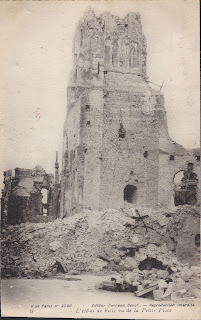The train ride, acceptable as it was, unhappily conveyed its sombre message. Those frequent stoppages and side trackings were due to the priority given to urgent traffic on the line coming from the opposite direction. Silently we watched all too many trains thunder by, every carriage bearing significantly the large symbol of the Red Cross. We detrained at Wizernes at 12 noon having covered the distance in exactly five hours.
Three hours later packs were humped on shoulders and the long trek northward recommenced. The route took us through several largish towns and on the outskirts of St Omer we broke off for a short rest at the side of the street. It was a crime to drink on trek. It was permissible to take one sip from water bottles provided the liquid went no further than the mouth. Any man caught in the act of swallowing was booked by the lynx-eyed NCO.
Near at hand was a little shop with various oddments displayed in the window and the NCO grudgingly gave me permission to make a purchase. Suspiciously he watched my movements and made no comment when I came out with a bundle of picture postcards of St Omer and an innocuous bag of sweets. The postcards were bought for a purpose. Although “St Omer” would be deleted by the censor, I cherished the hope that the receipt of a never-ending stream of photographs of a large and attractive French town (probably taken in 1901!) might perhaps set my mother’s mind at rest, disturbing her less than the rather forbiddingly worded ‘Field Postcards’.
As for the sweets, even Bradley didn’t guess that the innocent looking chocolates contained alcohol – so I was responsible for him breaking the pledge for the first time in his life. As thirst quenchers they were a failure but our spirits were fortified for the rest of the journey to Bayenghem (La Commune) where the twelve mile trek ended at 10:30pm.
Reveille 1:30am.
Left Sus-Saint-Léger 3am.
Marched Bouquemaison (6am).
Entrained 7am.
Arrived Wizernes 12 noon.
Marched to Bayengham (La Commune) - 12 miles, 3pm - 10:30pm with tea rest.
 |
| Original diary entry |
 |
| Original journal notes |
"On 24th July, the Battalion left Sus St. Leger and moved to La Commune, about seven and a half miles north-west of St. Omer and in the Fifth Army area. The Battalion paraded at 2:30 in the morning and, after tea had been served out to the men from the cookers of the Q.V.R., marched to Bouquemaison station. Here the Battalion entrained, and, after a five hours' journey, attended by the usual discomforts of the cattle trucks, reached Wizernes, three miles from St. Omer, about noon. Dinners were served in a field near Wizernes station, and at 3:15pm the Battalion paraded again and marched to La Commune, where it arrived at ten o'clock at night. The total distance marched during the day was about eighteen miles."
Excerpt from "The War History of the 1st Battalion Queen's Westminster Rifles 1914-1918" [ISBN 1-84342-610-2]
Excerpt from "The War History of the 1st Battalion Queen's Westminster Rifles 1914-1918" [ISBN 1-84342-610-2]
Google Maps entry for Wizernes here
Google Maps entry for St Omer here
Google Maps entry for Bayenghem here
Google Maps entry for La Commune here










































